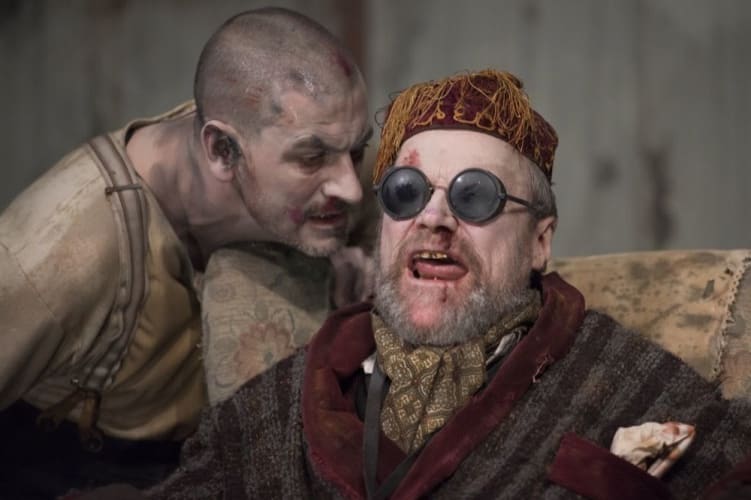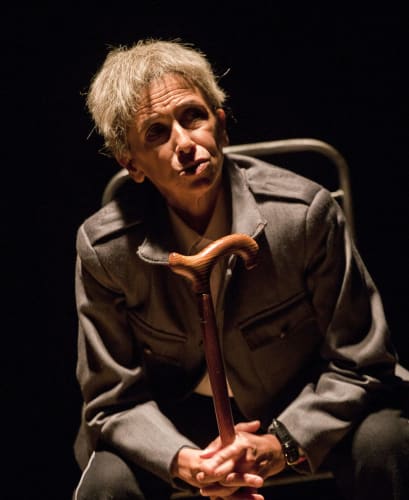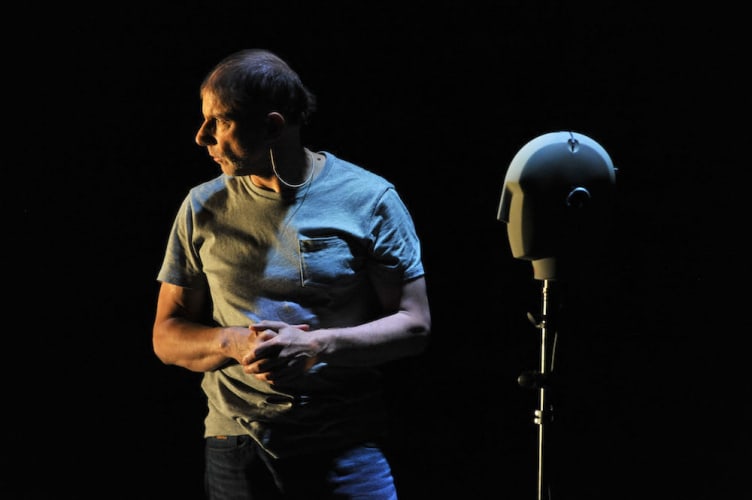Producing theatres
Royal Exchange Theatre
The Royal Exchange had a very impressive year, kicking off with the wonderful Julie Hesmondhalgh in Wit, a play about a dying woman that could easily have been depressing but was actually thoughtful, moving and surprisingly funny. This was followed by a co-production with the National Theatre of Ben Power's script that merges three plays by D H Lawrence, which proved to be another great piece of theatre with some very strong performances.
Michael Buffong made a welcome return to the Exchange to direct Don Warrington in the title role of King Lear, another great production which featured several notable performances other than the lead including Miltos Yerolemou as the Fool, Wil Johnson as Kent, Philip Whitchurch as Gloucester, Alfred Enoch as Edgar and Fraser Ayres as Kent—try picking just one supporting actor nominee out of that lot. The production was filmed and broadcast on TV over Christmas.
The Night Watch was an adaptation of the Sarah Waters novel that was largely successful and brought great performances out of the likes of Jodie McNee, Kelly Hotten and Lucy Briggs-Owen, amongst others. This was followed by another modern literary adaptation with Howard Jacobson's The Mighty Walzer set just down the road in Prestwich, which was very entertaining and again had some notable performances.
Sarah Frankcom's production of A Streetcar Named Desire was not especially notable other than for a decent Blanche Dubois from Maxine Peake. Breaking the Code was a great revival of a 30-year-old play about someone who is now a Manchester icon, Alan Turing, but was certainly less well-known when the play was written.
The Exchange ended the year on a high note with a wonderful revival of the Neil Simon, Cy Coleman and Dorothy Fields musical Sweet Charity.
Octagon Theatre
The Octagon came out with armfuls of trophies at the Manchester Theatre Awards for its 2015 season, but 2016 didn't start off quite so strongly.
The first two productions both featured two very good actors, Colin Connor and Katy Cavanagh, in a revival and a sequel from local writer Jim Cartwright. However Two, which premièred at this same theatre in 1989, was rather patchy and didn't get the best out of either the script or the actors and Two 2 wasn't worth waiting nearly 30 years for as it looked more old-fashioned and less accomplished as a script than its older sibling.
Next up was another revival of a play originally commissioned by the Octagon back in 1998, Charlotte Jones's Martha, Josie and the Chinese Elvis, which was fairly entertaining but not particularly memorable, but it did see the return of former artistic director Mark Babych as director.
Things picked up with Elizabeth Newman's production of To Kill A Mockingbird, which wasn't without its flaws and was on a rather cramped set but had some strong performances, including ever-reliable Rob Edwards as Atticus Finch and a remarkable portrayal of young Scout by 10-year-old Jasmine De Goede (the part shared with Lucy Doyle Ryder, whom I did not see).
Edwards—along with many of the Mockingbird cast—returned as Leontes in A Winter's Tale, a production which was a little long but had some fine moments and performances, including the wonderful Amy Nuttall as Hermione. The Octagon ended the year with Mike Kenny's adaptation of Cinderella, which was a long way from the pantomime version and perhaps more appropriate for older children and adults than for young children but was an interesting take on the well-known story.
HOME Manchester
While the web site may be largely dominated by film (and if you check in on Facebook when you're there you are only asked about which film you are there to watch), the theatre programme at HOME has proved to be as diverse and different in its first year and a half or so as it promised to be in Walter Meierjohann's preview season as Director of Theatre in venues around the city back in 2014. That's not to say it is always successful.
It kicked off the year with a short run of an intensely physical but ultimately rather confusing Macbeth from co-directors Carrie Cracknell and Lucy Guerin in a co-production with the Young Vic and Birmingham Rep. This was followed by another co-production, this time with Citizens Theatre in Glasgow, of Beckett's Endgame, which was brilliantly detailed and compelling throughout. Director Dominic Hill coaxed some extremely good performances out of Coronation Street stars David Neilson and Chris Gascoyne as Hamm and Clov.
Manchester was one of the few cities in the world lucky enough to see (and I was one of the few lucky enough to get a ticket for) Simon McBurney's stunning solo piece The Encounter, which put the audience in headphones to play with surround-sound technology and provided an intimate look into McBurney's own family while telling the story of the book Amazon Beaming by Petr Popescu. It was typical McBurney in the way it played around with narrative to take you deeper into the story and into yourself, resulting in an intense and memorable theatrical experience.
On Corporation Street saw the return of Irish company ANU, which produced the stunning Angel Meadow for home in 2014, to mark the twentieth anniversary of the IRA bomb that destroyed a large part of Manchester's city centre in 1996. This was another "immersive" production that took small groups of spectators around different parts of the building for short set pieces, and it was fine, but somehow it just didn't have the drive or intensity of the early production so was ultimately a bit disappointing.
For The Emperor, Meierjohann brought the wonderful Kathryn Hunter back to Manchester for a dazzling, tour-de-force, almost-solo performance in which she played a huge array of male and female characters to tell the story of Ethiopian Emperor Haile Selassie through the voices of his servants and close associates. Another welcome return was Kneehigh with the joyous 946: The Amazing Story of Adolphus Tips, based on the story by Michael Morpurgo and directed by Emma Rice, who at the time was staying quiet about the furore which had just erupted over her artistic directorship of Shakespeare's Globe.
The year ended not particularly festively but certainly strongly with an effortlessly wonderful performance by Niamh Cusack as Helen Alving in Ibsen's Ghosts which had some modernisations to the script which didn't always sit well but the most powerful moments, all from Cusack, were breathtaking.
Theatre by the Lake
Ian Forrest's last season at the Keswick lakeside theatre was the usual mix of the commercial with the more adventurous, the former largely in the main house and the latter in the studio. My trip to Keswick didn't start too promisingly with the creaky and extremely dated comedy Watch It, Sailor, which really has nothing to merit a revival at all if this production was anything to go by. However things picked up considerably with a compelling revival of David Hare's play about the Iraq conflict The Vertical Hour, which had gained a new topicality with the publication of the Chilcott Report.
My next main house visit was for another play very much of its time, Frederick Knott's Columbo-style murder thriller Dial M For Murder, which was a little long but kept the tension and still kept audiences guessing more than sixty years after its first outing. We were then transported back to Ancient Greece for Sophocles' Elektra in an adaptation that could be a bit wordy at times but was a compact and intense hour and a half with a remarkable central performance from Joanna Simpkins in the title role.
Rona Munro's Iron was a powerful and very well-performed drama about a mother and daughter reunion, the former in prison for killing her husband fifteen years earlier and the latter now a successful business woman who may have some repressed memories that would shine a whole different light on her mother's situation and their relationship.


